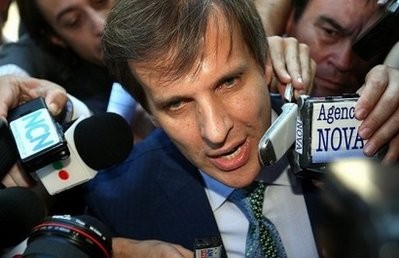
BUENOS AIRES, Jan. 29 (AFP) – Argentina's embattled central bank chief, Martin Redrado, resigned Friday amid a row with President Cristina Kirchner over her bid to use reserves to pay down government debt.
"I feel that my term at the head of the Central Bank has concluded and I have decided definitively to leave the office of president of the Central Bank, satisfied with the duties I have performed," Redrado told reporters.
Redrado clashed with Kirchner as she sought to set aside 6.5 billion dollars in central bank foreign currency reserves to pay government bonds maturing this year, a move she described as necessary to shore up Argentina's standing in international markets.
Redrado had said paying down the debt from Argentina's reserves could lead creditors who lost money during the country's massive 2001 loan default laying claim to the reserves.
He harshly criticized the government Friday, accusing Kirchner of "permanently trampling institutions" and trying to use "the savings of all Argentines."
The dispute between the pair had verged on a full-blown crisis, after the Argentine leader issued a decree firing Redrado.
He refused to leave and a federal court blocked his dismissal January 7, saying Kirchner had failed to obtain congressional approval.
For its part, the government shrugged off Redrado's announcement, insisting that a sacked employee has no post from which to resign.
"For us, there is no resignation," said cabinet chief Anibal Fernandez, who stressed that a new decree will finalize Redrado's sacking.
Redrado's departure came as a three-member bicameral congressional commission was to determine whether he acted properly and advise Kirchner of its findings, although she was not obligated to follow its recommendations.
He had initially refused to testify before the panel unless Kirchner revoked her order removing him from office, but reversed that position and hinted he might resign after addressing the committee.
Argentina has struggled to shake off pariah status in world financial markets following a 2001 default, but Redrado's opposition to using reserves to pay off maturing debt received support from counterparts around the world, including European Central Bank president Jean-Claude Trichet.
























